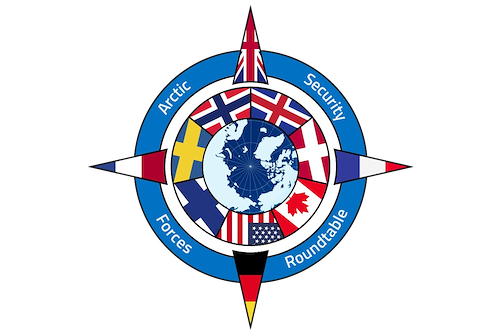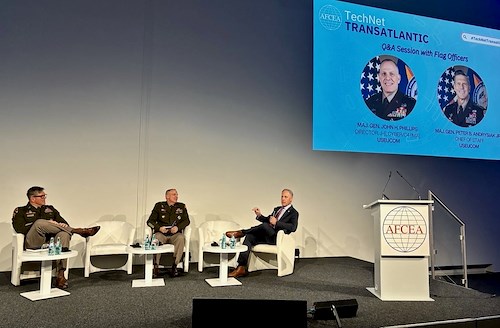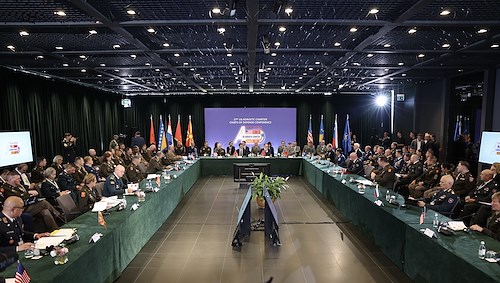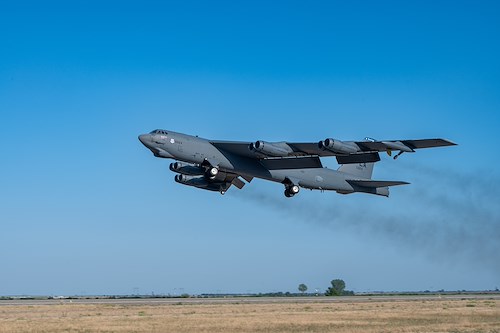Gallery contains 1 image
×
Photo 1 of 1
Military leaders discuss Arctic security, cooperation in semiannual forum
Photo by: U.S. European Command Public Affairs
The Arctic Security Forces Roundtable, held virtually today, brought together 36 senior military leaders from 11 European and North American nations to conduct wide-ranging discussions on issues impacting the High North.
Hosted by the French Ministry of Defense, this 13th iteration of the roundtable aimed to build and enhance shared Arctic awareness and cooperation, promoting a secure, stable Arctic region where nations work together to address challenges.
“Today, we stand at a critical time for international and European peace and security,” said French Air Force Col. Bruno Cunat, deputy head of Europe, North America and multilateral actions service at the French Ministry of Defense directorate general for international relations and strategy. “We are very pleased to host the Virtual ASFR 22 to promote multilateral frameworks and exchanges in such an international context, especially a few months after the publication of France’s first polar strategy,” he added. Cunat served as the official host for today’s meeting.
ASFR conducts two meetings each year, alternating between in-person gatherings hosted by Arctic nations Canada, Denmark, Finland, Iceland, Norway, Sweden or the U.S. and virtual gatherings hosted by observer nations France, Germany, the Netherlands or the United Kingdom.
The group of senior military leaders discussed everything from France’s perspectives on the Arctic, the results of the first Arctic 7 Chiefs of Defense conference as well as how the war in Ukraine might impact the strategic landscape in the Arctic.
“In a year in which France, the United Kingdom and the United States each released renewed Arctic strategies – against the backdrop of Europe experiencing the unprovoked, unjustified invasion of one nation by another nation along its eastern flank - gathering these military leaders and cadre of regional subject-matter experts was critical,” said U.S. Air Force Brig. Gen. Edward Vaughan, the U.S. European Command deputy director for security cooperation, policy, partnering and space. “In fact, in America’s National Strategy for the Arctic Region, the first of four strategic pillars is ‘security,’ which the ASFR is best suited to support as it coordinates shared approaches with Allies and partners to mitigate the risks of unintended escalation.”
Established and co-chaired by Norway and USEUCOM since 2010, the ASFR is a flag-and-general-officer level, military-to-military forum designed to promote regional understanding and enhance multilateral security cooperation in the High North. ASFR is the longest running military forum focused on the Arctic’s uniquely challenging security dynamics.
“As rapidly as world events develop and shift, alongside the impact climate change has on military operations, gathering both Arctic and non-Arctic nations under the ASFR umbrella to discuss emerging dynamics every six months is imperative,” said Norwegian Navy Rear Adm. Solveig Krey, the Norwegian Defense Staff chief of operations. “ASFR is just one of a long list of examples demonstrating the strength and unity of purpose shared by European and North American Ally and partner nations alike.”
U.S. European Command (USEUCOM) is responsible for U.S. military operations across Europe, portions of Asia and the Middle East, the Arctic and Atlantic Ocean. USEUCOM is comprised of more than 64,000 permanently assigned military personnel and works closely with NATO Allies and Partners. The command is one of two U.S. forward-deployed geographic combatant commands headquartered in Stuttgart, Germany.







